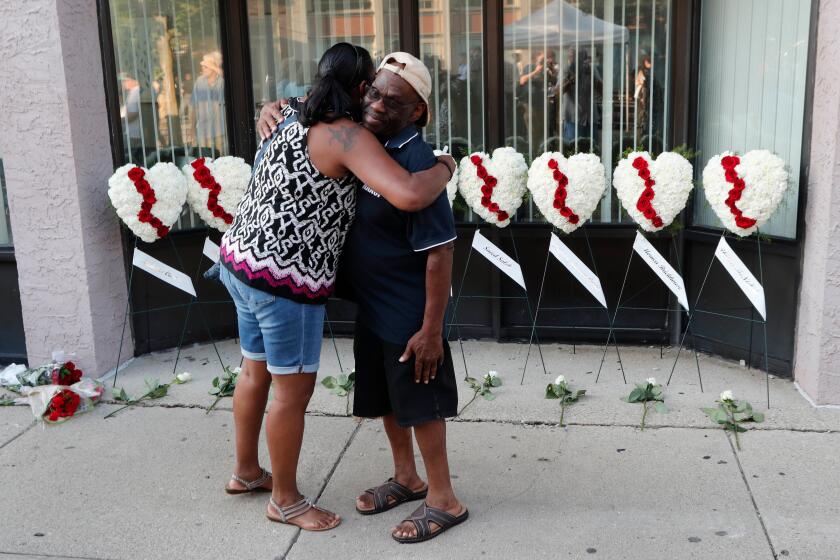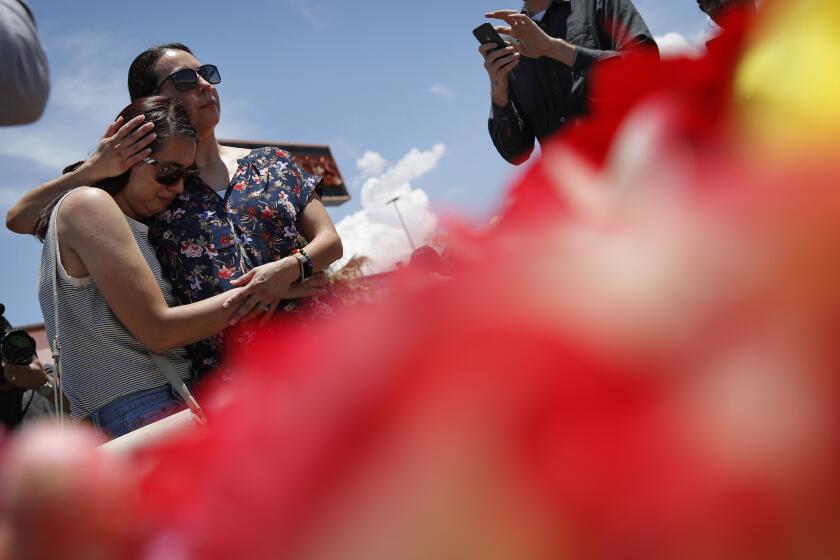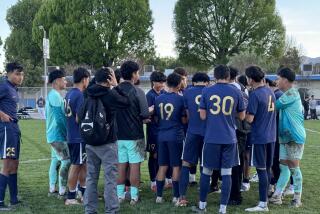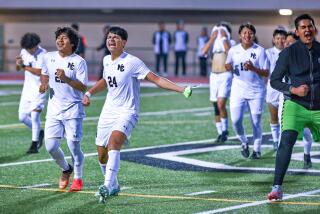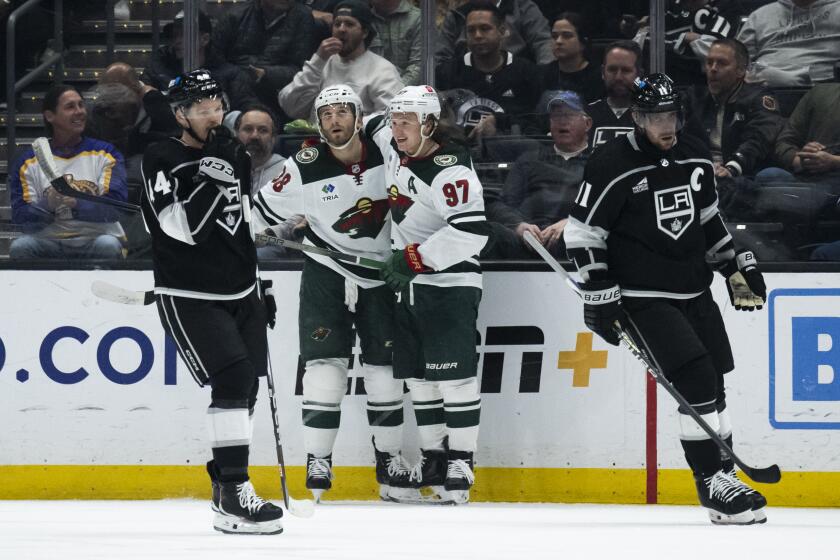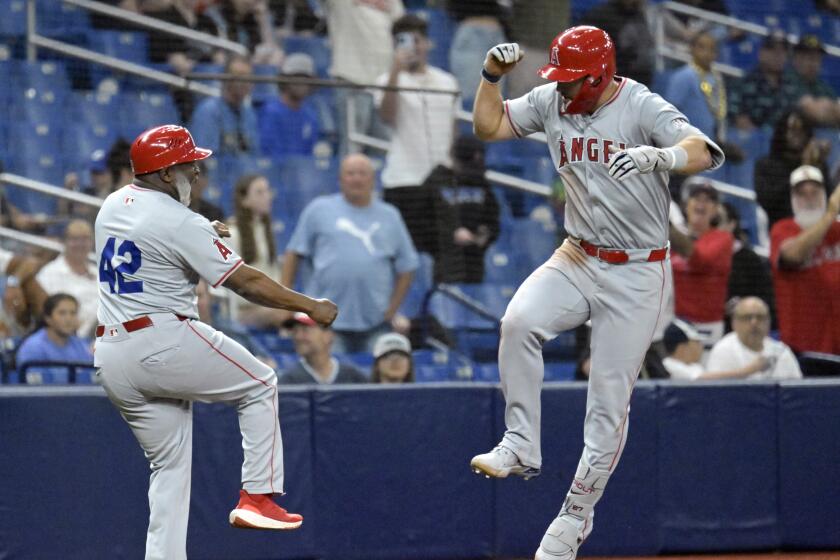El Paso team travels to shooter’s backyard for a game that brings unity, if not a Hollywood ending

After everyone has broken a sweat, that familiar locker room smell emerges. Dressed in their dark blue pants and white jerseys with blue and gold accents, some players from El Paso’s Eastwood High School walk around as if possessed.
Sweat rolls down their faces. With their shoulder pads on, wearing their cleats, they look much bigger. They scream and yell, often at no one in particular. “Let’s go!” someone screams. “Vamonos!” someone yells.
Others, while they wait to play Plano Senior High School, rap along with the thumping music that will fill the room until head coach Julio Lopez tells them to shut it off. Some players just sit there, on the floor with their backs against a wall, in silence.
Perhaps, as one coach demanded earlier, they’re visualizing everything that they will do. Or maybe, as they nibble on their mouthpieces, they’re thinking back on everything that’s happened in El Paso during the last month and everything that’s happened to the Eastwood community during the last week.
It’s impossible not to think about what this game symbolizes. For days before Thursday’s game, cameras have followed the team’s every move. From their arrival in Plano, after an 11-hour bus ride from El Paso, to their pregame meal. Nor could they miss the cameramen riding on their police-escorted team bus after that meal.
When they arrived at the Star in Frisco, Texas, Dallas Cowboys owner Jerry Jones welcomed them to the team’s headquarters. Cameras were there as Jones talked to coach Lopez and shook every player’s hand.
“This is a different game.” Josh Bell, Eastwood’s defensive backs coach, said what everyone knew.
While El Paso recovers from a mass shooting Saturday, Dayton, Ohio, faces its own shooting early this morning.
A different game.
Because a month and a few days ago, a man drove from this part of the state to El Paso, a city so distant from other large Texas cities that it’s in a different time zone.
On a Saturday morning, he opened fire in a Walmart that’s only a few miles from Eastwood High School. Twenty-two people — with names like Garcia, Hernandez, Flores, Rodriguez — died because, according to the shooter’s presumed manifesto, he feared a “Hispanic invasion” of Texas.
That killer, who confessed to targeting Mexicans, graduated from Plano Senior High School.
A different game.
Because a few days ago, at around 3 in the afternoon on Labor Day, New Mexico police responded to the report of a drowning at a lake. Four hours later, they recovered the body of a former Eastwood High School player who had earned a scholarship to play football at Western New Mexico University.
That was Eddie Cruz. Before every game, Lil Wayne’s music would blast from his headphones. He was the favorite player of coach Lopez’s 5-year-old son. The same son who during the El Paso massacre was playing T-ball a few miles from the Cielo Vista area where it all occurred.
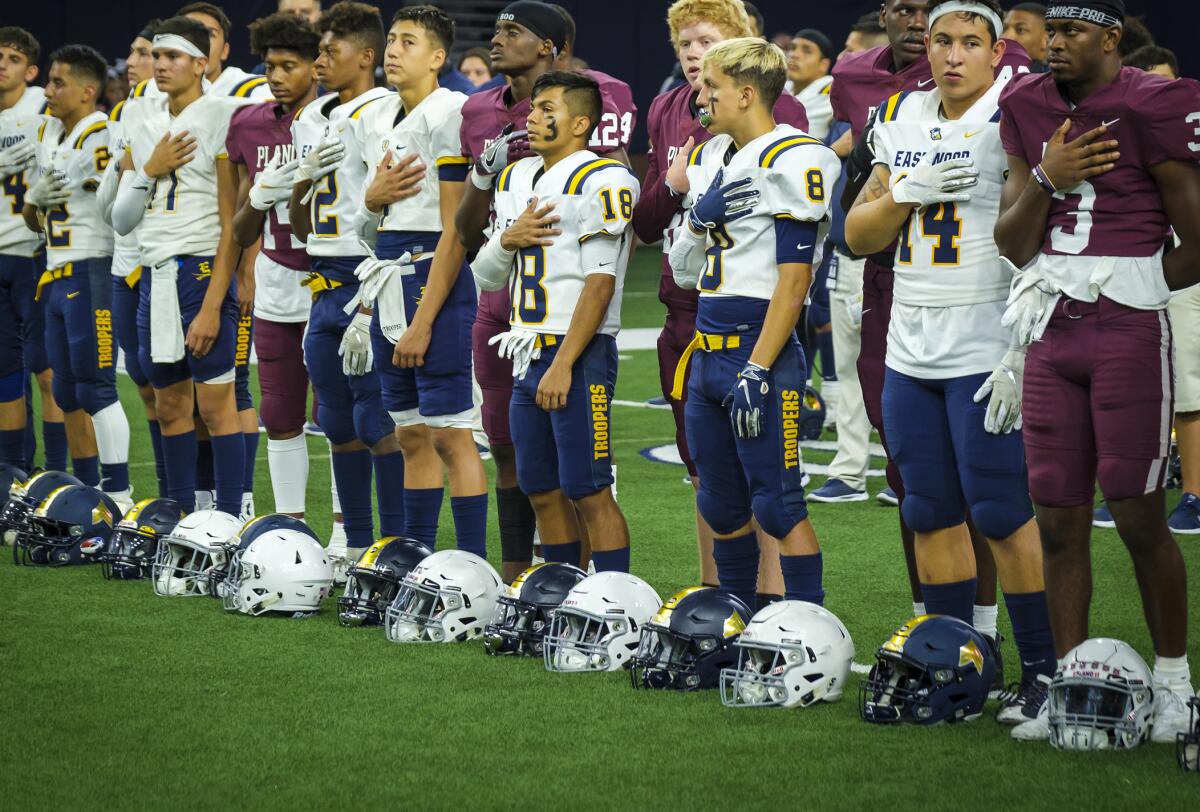
“We saw the helicopters flying over us,” coach Lopez remembers. “We didn’t know, at the time, how far out it had spread.” In the immediate panic, rumors said there was more than one killer. In the hours that followed, that horrifying question lingered: “What if they come back?”
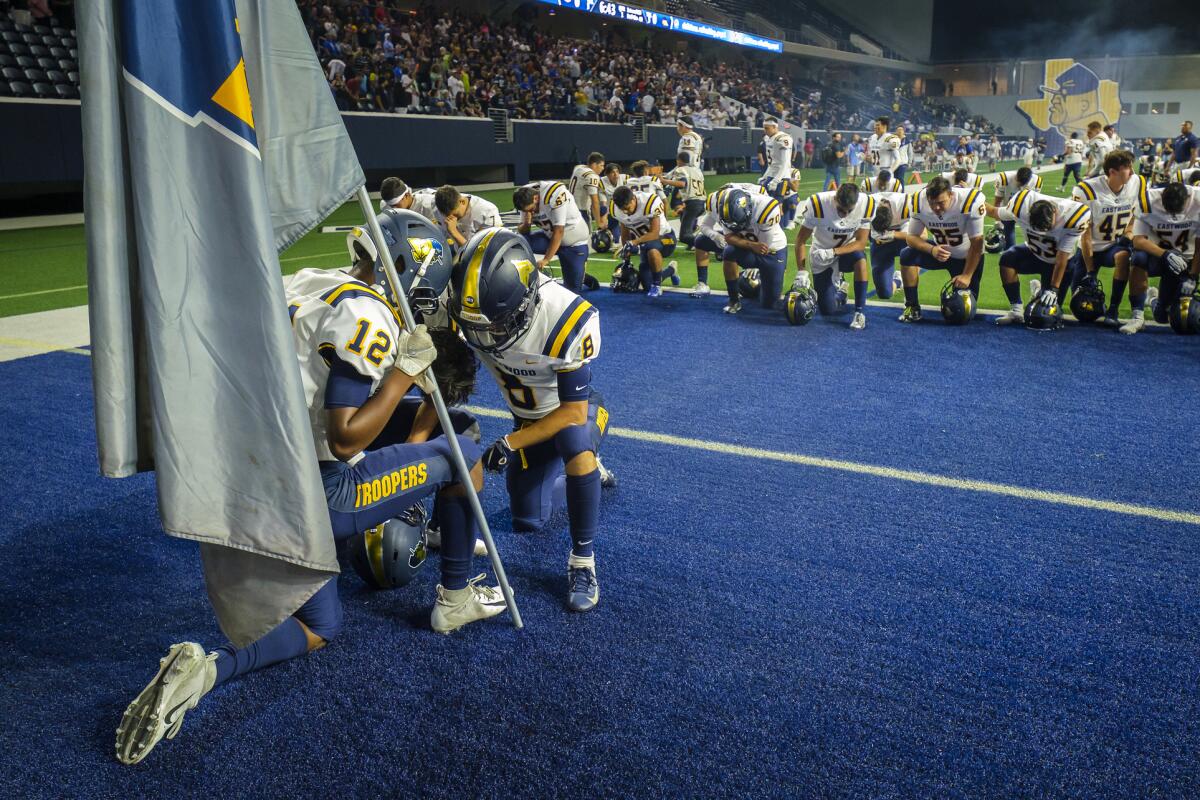
A different game.
Because of that shooting, this almost didn’t happen. Three weeks ago, Plano Independent School District administrators canceled the game, citing “safety concerns for the participants and fans of both teams.” Both the El Paso and Plano communities loudly voiced their displeasure.
“If anybody’s going to cancel a game because they’re scared or worried about more bloodshed, it would be El Paso, certainly not us,” Jennifer Davis said.
Her son plays for Plano Senior. On her own, she began a fundraiser for the victims of the El Paso massacre. She planned to drive to El Paso and deliver the money on the day of the canceled game.
With pressure from both communities, including elected El Paso representatives and Plano Senior players who started an online petition, administrators reversed their decision.
The day after canceling the game, they put it back on the schedule and move it to an indoor stadium with increased security. The game became a symbol of more than what Texas high school football already is, those mythical Friday night lights that unite communities across the state. Those games that shouldn’t be so crucial, yet they are.
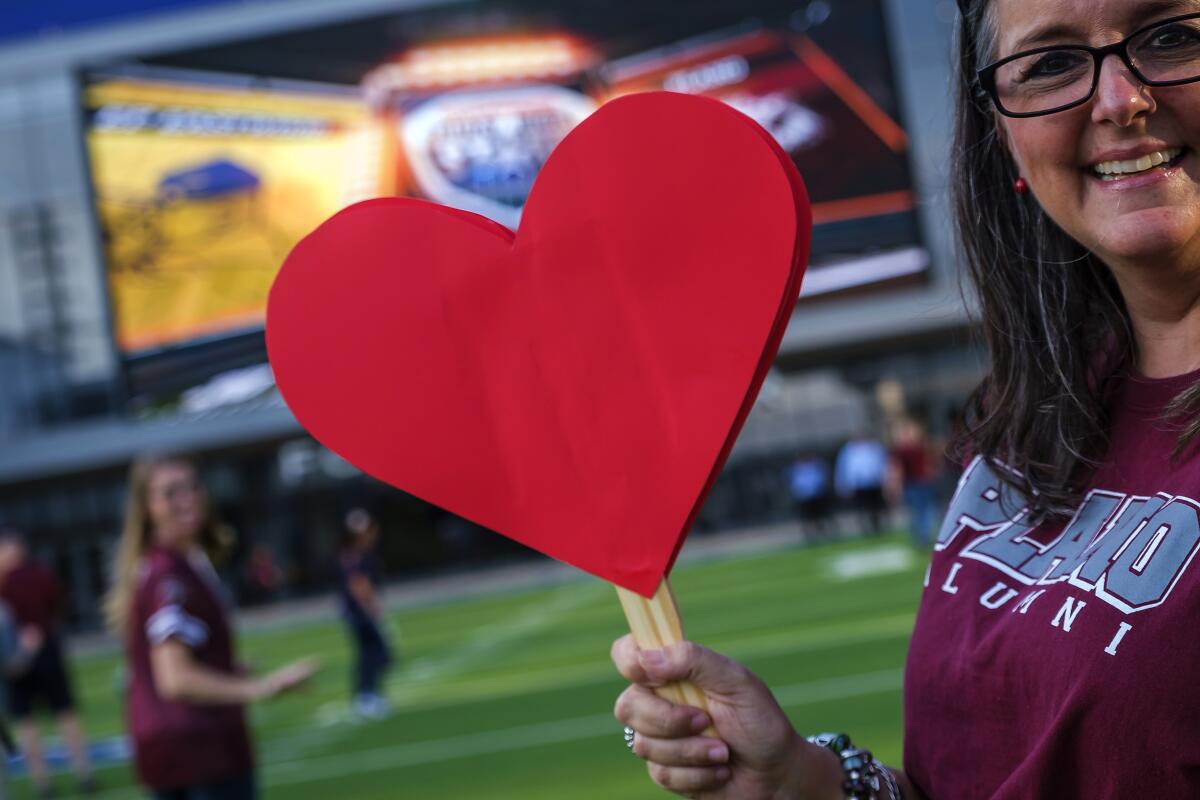
These games mean something.
And because this specific game matters more now than it did a month ago and even more than it did a few days ago, each Eastwood player has a decal on the front of his helmet, a few inches above the face mask. Quarter-sized with a blue background and in white letters, it reads, “EC 3.” It’s Eddie Cruz’s initials and the number he wore at Eastwood. Two other decals are on the back of their helmets, each a different logo of the city’s motto after the massacre: El Paso Strong.
Throughout the crowd, there are El Paso Strong T-shirts. There’s a bus full of Eastwood parents and newfound fans from El Paso who rode 11 hours to support the team. Groups of other El Pasoans, those who now live in north Texas and came here for better opportunities, also cheer for Eastwood.
“It’s our city,” Arissa Gaytan says of El Paso. She’s lived in north Texas since 2012. “Even though we left and are no longer living there, it’s still what I consider home. I’ll always consider it home.” Gaytan is attending the game with about 10 friends from El Paso who all live in north Texas. Some wear their black El Paso Strong T-shirts. Others wear T-shirts touting Chico’s Tacos, the iconic El Paso restaurant that’s one of the many things missed from back home.
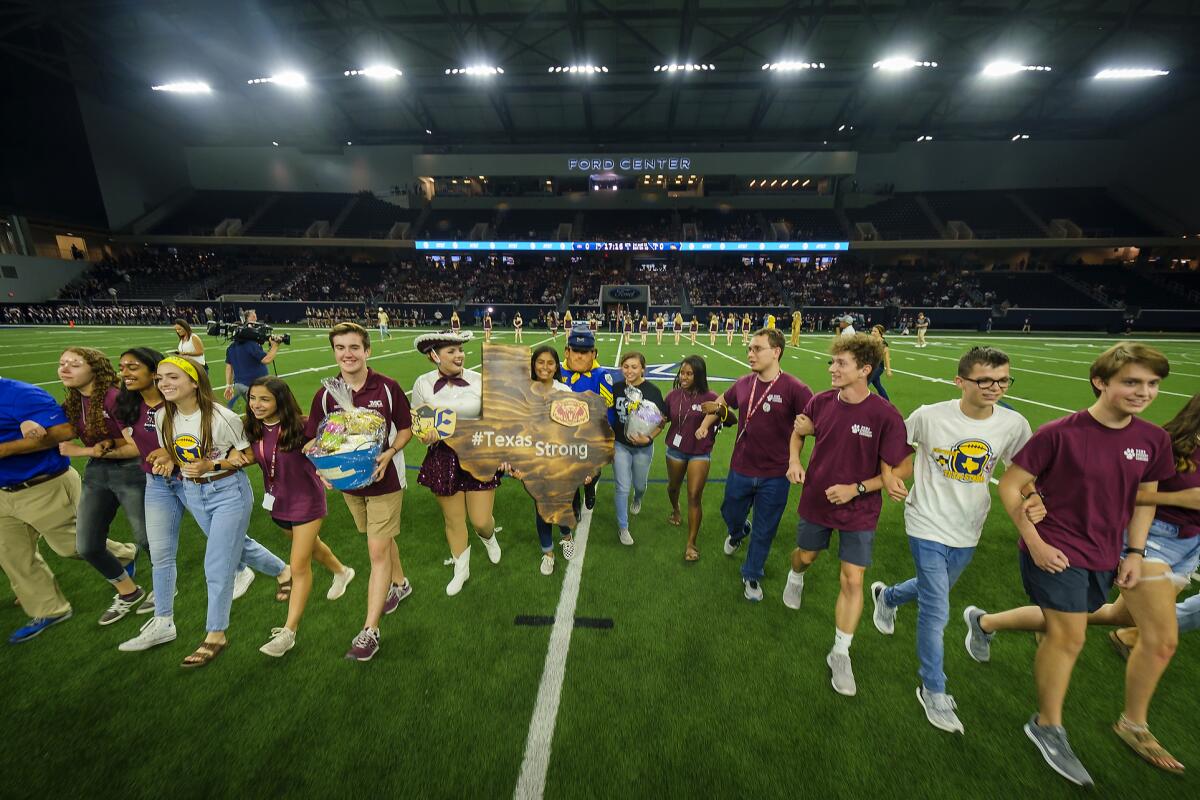
Irasema Ramirez is also from El Paso. She moved to north Texas a year and a half ago. Her daughter, who remained in El Paso, attends Eastwood. On the day of the shooting, she watched as her hometown became worldwide news.
When the local evening news began, she watched as helicopters’ cameras showed a home where the killer had lived, near where Ramirez shops.
“It just didn’t sit well with me,” Ramirez says, recalling her emotions upon discovering the killer responsible for destroying part of her home came from here. “I don’t even know how to explain it.” Her voice cracks.
“I got this anger. Like an immediate anger. And I don’t want to say hate because hate is such a big word, but it made me feel uncomfortable and unsafe.”
This was a different game.
And because of all this match-up symbolizes, coach Lopez enters the room at about a quarter to 7 p.m. and, after the music is shut off, after the doors close, muffling the sounds of high school bands, and after everyone quiets, he admits his pregame speech is also different.
He talks about Eddie Cruz, often just calling him “3.” All watch as coach Lopez explains how the hardest part of dealing with this is knowing they’ll never see him again or his smile. Coach Lopez’s voice, full of the grief already apparent in his eyes, grows louder and more passionate as he walks back and forth, retreading the same 20 feet at the center of the room.
“We might have something that we have to come back from. But we’ve been dealing with that for a month. We’ve been dealing with that at a larger scale for a month.”
— Julio Lopez, El Paso Eastwood High football coach
“You have an opportunity tonight,” coach Lopez says. “An opportunity not just to play for 3, not just to play for our town, and our city, and the victims, and all the people, and all the bad that’s happened in the last month, but you have an opportunity to live your life tonight.”
Coach Lopez, a young man in his late 20s with a young family, talks. And there are moments when it sounds as if he’s realized this is too much to handle without letting a few tears flow.
Parts of his speech apply to both this game and life. Because if nothing else, that’s ultimately the goal or, at least, the hope. The hope that at this level, this brutal and violent game gives more — something immeasurable — than what it takes from those who play.
“You’re gonna go through adversity at some point.” Lopez’s voice echoes throughout the cramped room. “We might be down, we might have a turnover. We might have something that we have to come back from. But we’ve been dealing with that for a month. We’ve been dealing with that at a larger scale for a month.” By the time he ends his four-minute speech, several of his players have bloodshot eyes. A few cry.
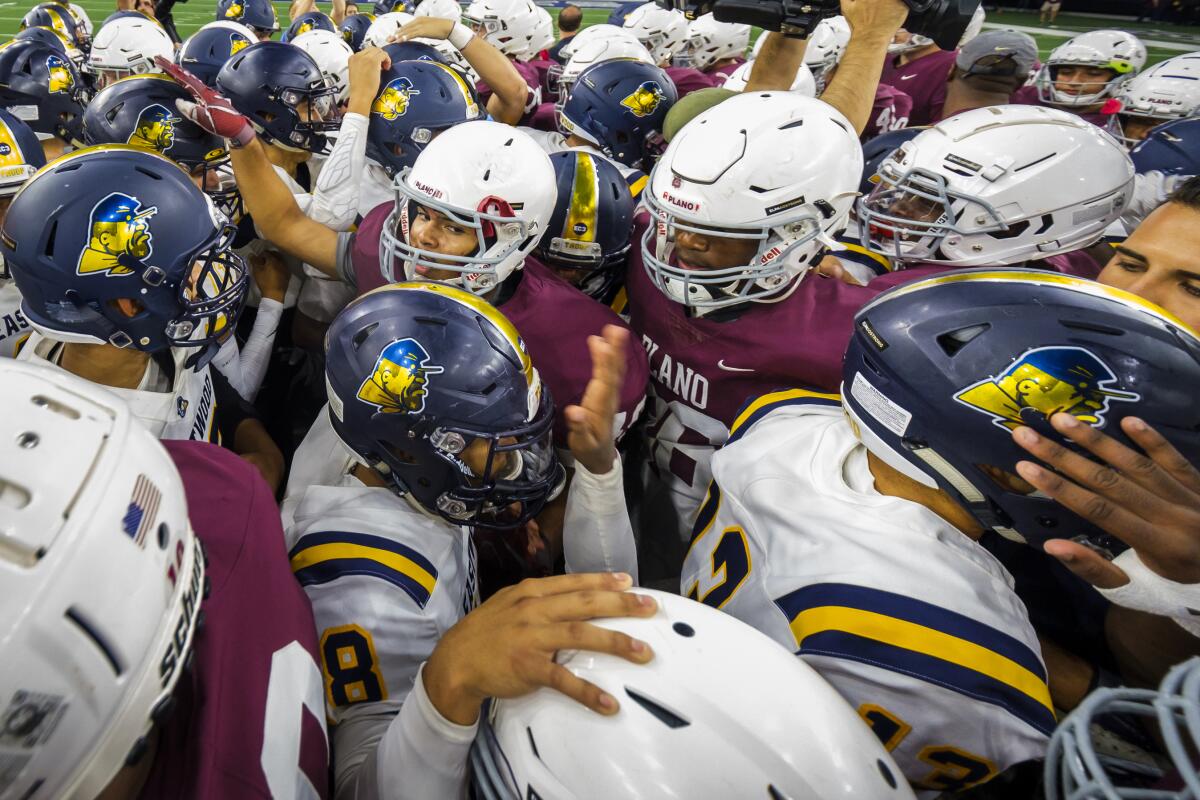
Sometimes after a tragedy, just when you feel as if you’ve moved on, you stumble on a small moment reminding you of what’s lost.
A song, a picture, a smell, a piece of clothing, something mundane reminding you that things will never be the same.
Sometimes, a moment like this, inside this locker room, inside this stadium, a half-day’s drive away from home, makes you realize that this game, despite what we want it to mean, may be little more than a cruel coincidence.
You realize that people must cheer, in part, to overcome pain here in this place that birthed the killer who changed everything for El Paso and Latinos in this country. As coincidences go, it’s one of the cruelest, turning what should have just been a game into another site to mourn for those we’ll never see again.
After the speech, some players dry their tears and return to their screams and yells. They exit the locker room and with coach Lopez and his 5-year-old son leading the way, they — with names like Garcia, Hernandez, Flores, Rodriguez — run out of a dark blue inflatable tunnel with Eastwood’s Trooper mascot on the front.
As the band plays and smoke fills that corner of the stadium, a player runs out holding an El Paso Strong flag. Another player hangs a jersey — No. 3 — on the back of the bench.
If this were a movie — playing against players noticeably bigger, from a school that’s won seven Texas state titles, with an enrollment more than twice their size, in a city wealthier than theirs by every metric — Eastwood would have defeated Plano Senior. The game would have accounted for more than a tough-fought loss. Perhaps it did.
On this night, Eastwood loses to Plano Senior, 43-28. They have an 11-hour drive back home. On Monday morning, the team will watch as their 18-year-old brother is laid to rest in El Paso.
The massacre of 20 people by a man who reportedly wanted to shoot “as many Mexicans as possible” marks what appears to be one of the deadliest hate crimes ever against Latinos.
More to Read
Get our high school sports newsletter
Prep Rally is devoted to the SoCal high school sports experience, bringing you scores, stories and a behind-the-scenes look at what makes prep sports so popular.
You may occasionally receive promotional content from the Los Angeles Times.
